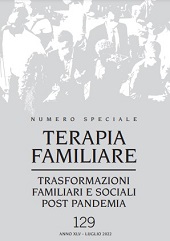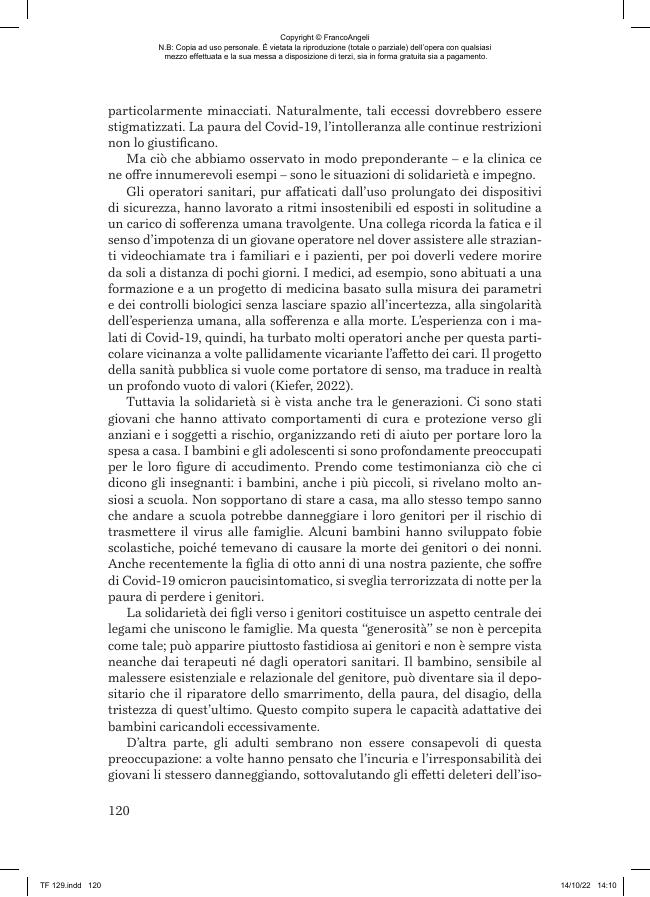Controversie etiche e cliniche di fronte al Covid-19
P. 111-128
Psychotherapists, from the beginning of the Covid-19 pandemic and still to- day, are grappling not only with an omnipresent death and pending mourning, but also with the ethical questions posed to individuals, families, and society, like those of justice, freedom, social fracture, solidarity between generations. They must treat, on an existential level, the people most affected by the pandemic, the impact of which has been multifaceted, serious and has made people lose faith in the future, especially among the youngest, a loss that has had as a corollary the increase in suicidal behavior.
In the last year, therapists have also had to deal with the refusal of vaccination and the exacerbation of positions that amplify the sense of mistrust and injustice. It is up to the therapists to testify publicly and not just privately pity - the sufferings and needs of their patients, to contribute to the development of a social dimension that supports survival, but also the desire to live a life that finds sufficient meaning, worthy and fair. [Publisher's text]
Gli psicoterapeuti, fin dall'inizio della pandemia di Covid-19 e ancora oggi, sono alle prese non solo con una morte onnipresente e con un lutto in sospeso, ma anche con le questioni etiche poste agli individui, alle famiglie, alla società intera, come quelle della giustizia, della libertà, della frattura sociale, della solidarietà tra le generazioni. Devono curare, a livello esistenziale, le persone più colpite dalla pandemia il cui impatto è stato multiforme, grave e ha fatto perdere la fiducia nel futuro soprattutto tra i più giovani, perdita che ha avuto come corollario l'aumento dei comportamenti suicidari.
Nell'ultimo anno i terapeuti hanno dovuto anche confrontarsi con il rifiuto della vaccinazione e l'esacerbarsi di posizioni che amplificano il senso di sfiducia e d'ingiustizia. Spetta ai terapeuti testimoniare pubblicamente - e non solo compatire privatamente - le sofferenze e i bisogni dei loro pazienti, per contribuire allo sviluppo di una dimensione sociale che sostenga sì la sopravvivenza, ma anche il desiderio di vivere una vita che trovi ai loro occhi un senso sufficientemente degno e giusto. [Testo dell'editore]
Forma parte de
Terapia familiare : rivista interdisciplinare di ricerca ed intervento relazionale : 129, 2, 2022-
Artículos del mismo número (disponibles individualmente)
-
Información
Código DOI: 10.3280/TF2022-129007
ISSN: 1972-5442
KEYWORDS
- Covid-19, Psychosocial impact of the pandemic, Justice and Solidarity, Mourning, Suicide, Vaccination, Therapeutic responses
- Covid-19, impatto psicosociale della pandemia, giustizia e solidarietà, lutto, suicidio, vaccinazione, risposte terapeutiche



